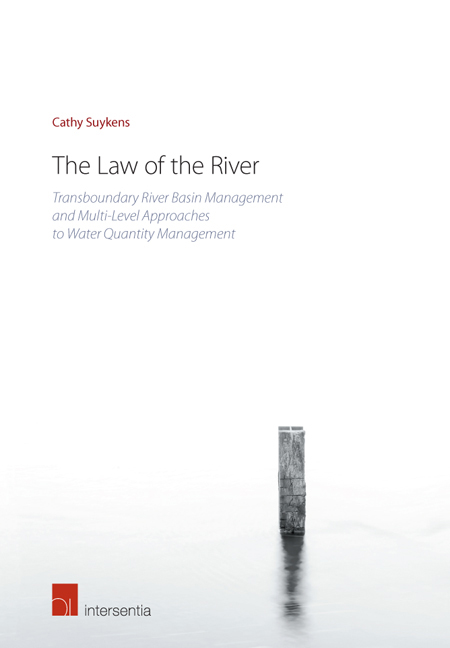 The Law of the River
The Law of the River Book contents
- Frontmatter
- Acknowledgments
- Contents
- Figures and Tables
- Acronyms
- Chapter I Introduction
- Chapter II The EU Legal Framework for Transboundary Waters with a Focus on Water Quantity Management
- Chapter III ‘Come Hell and High Water’ –The Law of the Scheldt District
- Chapter IV Case Study: Transboundary Water Governance in the United States with a Focus on the Delaware Basin
- Chapter V Recommendations
- Chapter VI Conclusions
- Bibliography
Chapter VI - Conclusions
Published online by Cambridge University Press: 12 October 2018
- Frontmatter
- Acknowledgments
- Contents
- Figures and Tables
- Acronyms
- Chapter I Introduction
- Chapter II The EU Legal Framework for Transboundary Waters with a Focus on Water Quantity Management
- Chapter III ‘Come Hell and High Water’ –The Law of the Scheldt District
- Chapter IV Case Study: Transboundary Water Governance in the United States with a Focus on the Delaware Basin
- Chapter V Recommendations
- Chapter VI Conclusions
- Bibliography
Summary
Since the entry into force of the WFD in 2000, the EU river basin approach has triggered an important shift in the environmental law landscape. This river basin approach brings about interesting legal challenges and opportunities. As established in the previous chapters, International River Basin Districts are subject to highly complex and fragmented multi-level governance systems. Member States sharing these International River Basin Districts are subject to EU-law requirements related to water management and need to ensure, to some extent, a coordinated implementation in these districts. This book has addressed the question to what extent the European legal framework warrants cooperation between Member States in International River Basin Districts with regard to water quantity management. The final conclusions of this book will be formulated in the sections below.
RESILIENCE THEORY AS A TOOL FOR EVALUATION
This book has built on social-ecological resilience theory to identify appropriate benchmarks for the evaluation of transboundary river basin management. Resilience theory is well equipped as a theoretical framework, because it revolves around finding ways for a certain legal or governance mechanism to thrive in the face of changing circumstances. River basins are inherently susceptible to such changing circumstances. Indeed, as was explained in Chapter I, several phenomena and uncertainties are associated with the management of freshwater resources. A major type of uncertainty that should be taken into account relates to the hydrological cycle and the impact of climate change on this cycle, for example changes in annual runoff, decrease of groundwater flow and the intensification of extreme events. However, climate change is not the only type of uncertainty river basin management schemes need to take into account. Other relevant factors include the performance of infrastructure relevant to the basin, economic and political volatility, demographic developments, and increased urbanisation. These phenomena are synergistic –climate refugees are a good illustration of this point.
Six benchmarks were formulated, which constituted a clear theme throughout this book:
(a) Integrated river basin management at the hydrological scale and nested governance;
(b) Equitable and reasonable utilisation and “no harm”;
(c) Transfer of information across jurisdictions;
(d) Meaningful public participation;
(e) Adaptability: monitoring and opportunities for learning; and
(f) Effectiveness and enforcement.
- Type
- Chapter
- Information
- The Law of the RiverTransboundary River Basin Management and Multi-Level Approaches to Water Quantity Management, pp. 345 - 354Publisher: IntersentiaPrint publication year: 2018


